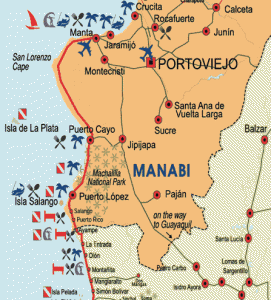 Ah, Manta. A jewel by the sea, combining (almost) all that I love about modern South America: an alternative reality to the Northern half of the continent, retaining that unique American robust and irreverent forward motion yet somehow sedate, private, moving at its own rate and rhythm, and forever painted in the icy pastels of the Inca decendants and the sandy sons of the Mantas and Valdivians, and the teeming textures of the Amazonian Shuar.
Ah, Manta. A jewel by the sea, combining (almost) all that I love about modern South America: an alternative reality to the Northern half of the continent, retaining that unique American robust and irreverent forward motion yet somehow sedate, private, moving at its own rate and rhythm, and forever painted in the icy pastels of the Inca decendants and the sandy sons of the Mantas and Valdivians, and the teeming textures of the Amazonian Shuar.
Of course, as a beach town, it carries most the heritage of the early coastal civilizations, which survived on the bounty of the sea. Near here emerged the proto-civilization, the first of the great native American cultures, the Valdivia (1000 BC). And right here where I am writing these lines, a couple of hundred meters from the Pacific coastline practically smack dab (less than one degree south) on the equator, for 2000 years, from 500 BC to 1500 AD, the Manta culture and its huge capital city, featured, according to Pizarro, wide avenues, majestic temples, grand plazas and monumental statues. They were fishing these waters and turning their catch into cebiche before Christ recruited the fishermen of Galilee.
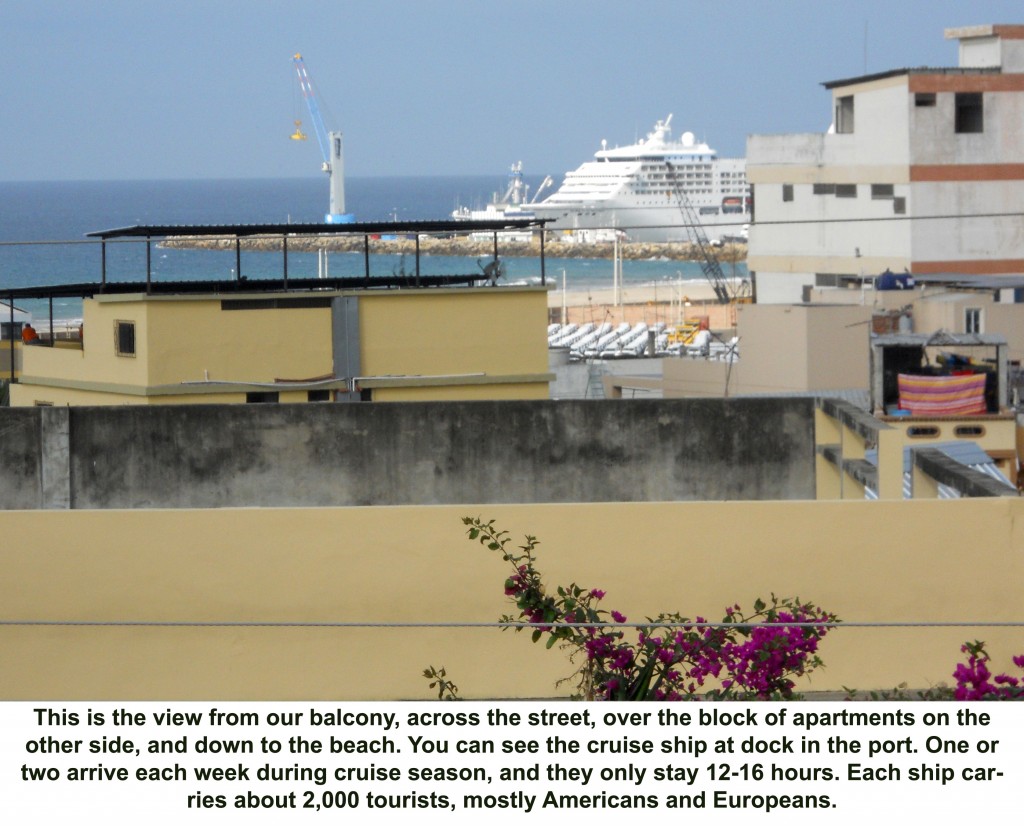 The “almost” in the first line refers to the limited influence here of the other major group of cultures that emerged in South America – in one of the most spectacular and otherworldly environments on the planet, the Andes Mountains. I did most of my admittedly unconsumated “academic” research in that challenging and rarified ecosystem. Whole human civilizations evolved and thrived at over 3 miles above sea level. Even at those altitudes it is a rich and varied ecosystem at these equatorial latitudes, much more so than the cold, austere Himalayas, the only higher mountains in the world, due to the Andes straddling the planets bulging midriff where there’s more oxygen at 16,000 feet than in the northern latitudes. There is agriculture, hunting and grazing at altitudes where Tibet is a frozen wasteland.
The “almost” in the first line refers to the limited influence here of the other major group of cultures that emerged in South America – in one of the most spectacular and otherworldly environments on the planet, the Andes Mountains. I did most of my admittedly unconsumated “academic” research in that challenging and rarified ecosystem. Whole human civilizations evolved and thrived at over 3 miles above sea level. Even at those altitudes it is a rich and varied ecosystem at these equatorial latitudes, much more so than the cold, austere Himalayas, the only higher mountains in the world, due to the Andes straddling the planets bulging midriff where there’s more oxygen at 16,000 feet than in the northern latitudes. There is agriculture, hunting and grazing at altitudes where Tibet is a frozen wasteland.
But if I miss the Andean wonderland, I can get on a bus and in 4 hours be within sight of active, snow-capped volcanoes.
About the third great South American ecosystem – the Amazon river basin – we can only say it’s a nice place to visit, but a green hell to live in, although we have never actually done so. We never quite got past the humidity and the bugs, so we don’t miss it much.
Manta itself is a bustling, diverse and growing urban area,. In fact, according to the latest census it is the fastest growing city in Ecuador. Current population about 300,000, it is centered around one of the best deep-water ports on the Pacific coast of South America. Its economy is built on three pillars: shipping, fishing and tourism. The fishing fleet consists of everything from small trolling launches and sport fishing boats to large vessels that stay at sea weeks at a time and include refrigeration and processing capacity. Manta is known (according to the bright metal monument featuring the humongous 30-foot, shiny blue and green fish located in the middle of a traffic roundabout in front of the Yacht Club) as the “Tuna Capital”. It doesn’t say capital of what; province, country, continent or world.
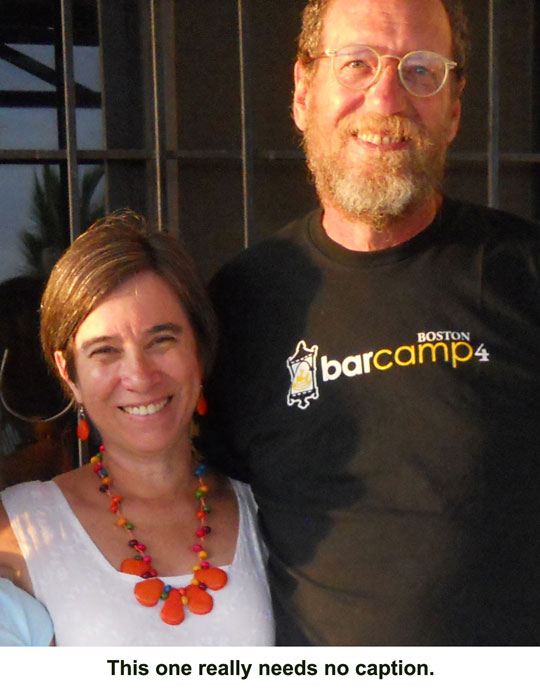 The shipping running in and out of Manta port consists of imports from North America (west coast ports), Asia (principally China), and Brazil (shipped through the Panama Canal, since even today, 160 years after the transcontinental railroad transformed North America, there is no way to get cargo across South America by land). The exports are mostly based on the fishing industry (canned tuna, fishmeal, frozen filets) or the large agricultural sector of the local Manabi province economy (platano, coffee, cacao, peanuts, pineapples, yucca, citrus and cattle).
The shipping running in and out of Manta port consists of imports from North America (west coast ports), Asia (principally China), and Brazil (shipped through the Panama Canal, since even today, 160 years after the transcontinental railroad transformed North America, there is no way to get cargo across South America by land). The exports are mostly based on the fishing industry (canned tuna, fishmeal, frozen filets) or the large agricultural sector of the local Manabi province economy (platano, coffee, cacao, peanuts, pineapples, yucca, citrus and cattle).
The port is big business, and may someday provide direct access to the Pacific markets for the abundant produce of the Amazon, that dream is decades away and right now it is suffering from an excellent example of the inbred inefficiencies that keep capitalism from flexing its velvet deathgrip around the throat of local life down here. The harbor itself is optimal, deep, clear and calm. But the infrastructure built around it, mechanized wharfs, high volume loaders, cranes, power grid components, are somewhat less than state-of-the-art and often in need of attention.
A few years ago a big Japanese multinational which specializes, among other things, in upgrading and operating world-class ports was on the verge of signing a long-term contract to invest in and administer the Port of Manta. The whole process had taken the better part of a decade to develop, between initial studies, impact statements, community outreach, the final proposal, financing negotiations, political maneuvering, amendments and back-room “bargaining” (payoffs). At the last minute there was a political (always political) blowup that blocked the signing. Two competing power groups which both had to sign on to the agreement, and who had agreed to set aside their differences, had experienced a renewal of hostilities, the theories of the cause of which were many and varied, my favorite being an insult at a “Quinceanero” (Sweet 15) party. The Japanese, aghast at their complete lack of control over or even understanding of the cultural complexities underlying financial operations (and everything else) in Ecuador, politely withdrew.
And now the Manta port is losing contracts to arch-rival Guayaquil (think Boston – New York, about the same distance down a coast a lot further south and on the other side of the continent). The older, recalcitrant machinery in Manta takes longer to load and unload a big cargo ship, and in that business time, especially time in port, is money. Guayaquil, at 3 million the biggest city in Ecuador, is more efficient.
Tourism is the most recent revenue stream to hit the big time. It has gotten really active during the last 15 years or so, both with upwardly mobile Ecuadorians and foreigners, mostly from North America and Europe, due to it’s great location on the coast, year-round temperatures of between 72-84 and ample supply of hotels and restaurants at the high, mid and low end of the tourist spectrum.
 Increasingly, Manta as well as Ecuador in general, is becoming a popular location for ex-patriot retirement. I shouldn’t carp, belonging to the demographic myself, but I am a bit embarrassed by the increasing hordes of horny elderly white guys gimping around town escorting younger-looking Latina women. A popular web site, International Living, has been touting Ecuador as a retirement destination due to its high standard and low cost of living (“Live well on half your social security payment”), but a lot of these geeks showing up are utterly unprepared for real life South America, no Spanish, never lived outside of Nebraska, and I don’t know if I fear more for them or their effect on the local scene. Certainly, nothing good can come of it.
Increasingly, Manta as well as Ecuador in general, is becoming a popular location for ex-patriot retirement. I shouldn’t carp, belonging to the demographic myself, but I am a bit embarrassed by the increasing hordes of horny elderly white guys gimping around town escorting younger-looking Latina women. A popular web site, International Living, has been touting Ecuador as a retirement destination due to its high standard and low cost of living (“Live well on half your social security payment”), but a lot of these geeks showing up are utterly unprepared for real life South America, no Spanish, never lived outside of Nebraska, and I don’t know if I fear more for them or their effect on the local scene. Certainly, nothing good can come of it.
On top of the tourists arriving by land, Manta is one of the obligatory stops for several big cruise lines. These mega liners, with a couple of thousand pasty skinned retirees aboard, take advantage of the deep-water port, inexpensive prices and gringo-friendly natives to spend 12-16 hours in town, during which most of the passengers disembark and go to the Bat Beach, eat at one of the 16 seafood restaurants thereon, hit the Supermarket for snacks and liquor they can’t get on board, hit the Fybeca Pharmacy for diarrhea or constipation pills, or pharmaceuticals available by prescription only at home, zoom out to Monticristi, home of the “real” original Panama hats a few kilometers down the road, hang at the local bars and try to pick up local girls or guys, but what can you do if you’re 80 and your ship leaves in 3 hours? Then they head back to their cabins and weigh anchor for Callao, Peru or Easter Island.
When the cruise ships are in town a battalion of Oltavolan Indians come down from their mountain redoubt and set up an extensive native market in the Manta Civic Plaza, an open-air event space where the modest Manta downtown runs up against the beach. The Oltavolans are the Israelites of the Native American tribes, wandering Jews dedicated to commerce and textiles. They are innate capitalists and have constructed a world-wide tribal network distributing all varieties of Andean folk artifacts. They fell into this role due to their mastery of modern textile production techniques and their successful modification of same to traditional Andean weaving and embroidering techniques. This is what originally brought me to Oltavolo, studying the textile industry, 38 years ago, just when they started to realize that there’s a big market out there. Today you see the Oltavolans in their typical white pajama pants and bright blue ponchos everywhere: New York, LA, New Orleans, Paris, London, Tokyo, Tel Aviv, wherever. They, and their fellow travelers the Andean flute bands, managed by a similar Native American mafia, are ubiquitous, now an element of the transnational zeitgeist.
They arrive, synchronized with the cruise ships, in the backs of 3 or 4 heavy trucks, 50 to 60 Indians and a Macy’s worth of wool sweaters, cotton embroidered shirts, wood and stone and tagua vegetable ivory carvings, woven ponchos, belts, shawls, hammocks, jewelry of all sorts, from silver and semiprecious stones, seashell, coral, Monicristi Panama hats, pornographic peace pipes, oil paintings and watercolors, blankets and rugs, coffee from the Galapogos Islands, mittens and scarves (here on the 80F beach), bags, purses and wallets, wool and alpaca pillows, guitar straps, hats, T-shirts, keychains, and fake original archeological relics.
Their trucks usually pull in at 4 am and by 7 the native market is open for business. The cruise passengers cycle through all day – there isn’t room in the Plaza for them to come all at once. I’m sure the Oltavolans have determined the exact optimal flow of tourists to maximize overall sales. At sunset, they load what’s left into the trucks, climb in back to sleep atop the soft bales of fine fabrics, and head back up into the mountains.
In the four months from January to April, high cruise season, this year Manta will receive 12 ships with a total of 16,900 passengers. Every time one arrives, they drop over $200,000 during their 8-hour visits to the city. Taxi drivers, restaurant owners, beer sellers, dance partners, everyone benefits. To insure their safety, when the ships come to town the police cancel normal leaves and flood the designated tourist areas with patrols.
Personally, I like Manta, and have chosen it as a provisional retirement destination for a number of reasons. First and foremost, it is a real, modern city, and I am pretty much a city guy. Sure, I love nature, and some of my most vivid memories are of mountaintops and waterfalls. But after a few days in the deep country I get bored silly, and start longing for lattes, exhaust fumes and increased dietary options. After a week I’m ready to hitchhike 80 miles to the nearest honky-tonk or store with a radio and a cold beer.
 Manta, on the other hand, has a population of about 300,000, and all the things that make a city livable for me: modern shopping malls, many fine restaurants, major league sports teams (OK, only soccer, but I like soccer), a tennis club which deigns to have me as a member, a multiplex movie theater, an Apple Store, two newspapers and several universities, book stores and stationary shops, the best of which is the Universidad Laica Eloy Alfaro of Manta (ULEAM). Eloy Alfaro was a Manabita native who led a revolution, served as President twice in the 19th century, and was eventually arrested and executed after a subsequent revolution.
Manta, on the other hand, has a population of about 300,000, and all the things that make a city livable for me: modern shopping malls, many fine restaurants, major league sports teams (OK, only soccer, but I like soccer), a tennis club which deigns to have me as a member, a multiplex movie theater, an Apple Store, two newspapers and several universities, book stores and stationary shops, the best of which is the Universidad Laica Eloy Alfaro of Manta (ULEAM). Eloy Alfaro was a Manabita native who led a revolution, served as President twice in the 19th century, and was eventually arrested and executed after a subsequent revolution.
But more important than the infrastructure are the people; friendly, open, hard-working but knowing how to relax and enjoy life. And they actually like Americans, as individuals at least although they aren’t particular fans of our government lately. They all seemingly have been to the States, have a relative living in the States, or are planning on going to the States soon.
Me, I’m glad to be here. Everything I used to miss from home when I was first traveling through South America 30 years ago can be found now. My computer has the New York Times and the Boston Globe hours before my delivered copy used to show up on the doorstep. My Nook has a bookstore full of books all of which are on my “must read” list. My cell phone can reach anyone I may want to talk to anywhere. The local SuperMaxi supermarket has Hunts Spaghetti Sauce, low-fat, lactose free milk, and Haagen Daaz Dulce de Leche ice cream, plus fresh-squeezed OJ and real fruits and vegetables, as opposed to the ersatz replacements modern agro-industry foist off on the gringos these days.
Plus, Manta is the ultimate service economy. If you’ve got a bit of gelt and patience, just about everything comes to you. On the beach you rent a recliner in the shade for a dollar all day, and ambulatory vendors come by with beer, coconut water, ice cream, stewed chicken, single cigarettes, candy, pastries and reading material. A farmer’s market comes to your door several times a day as ambition agriculturists hire big trucks filled to the beams with bunches of green platanos and yellow bananas, mountains of pineapples, coconuts, oranges and ears of corn. As previously described, an entire Andean market comes to town every time a cruise ship pulls in.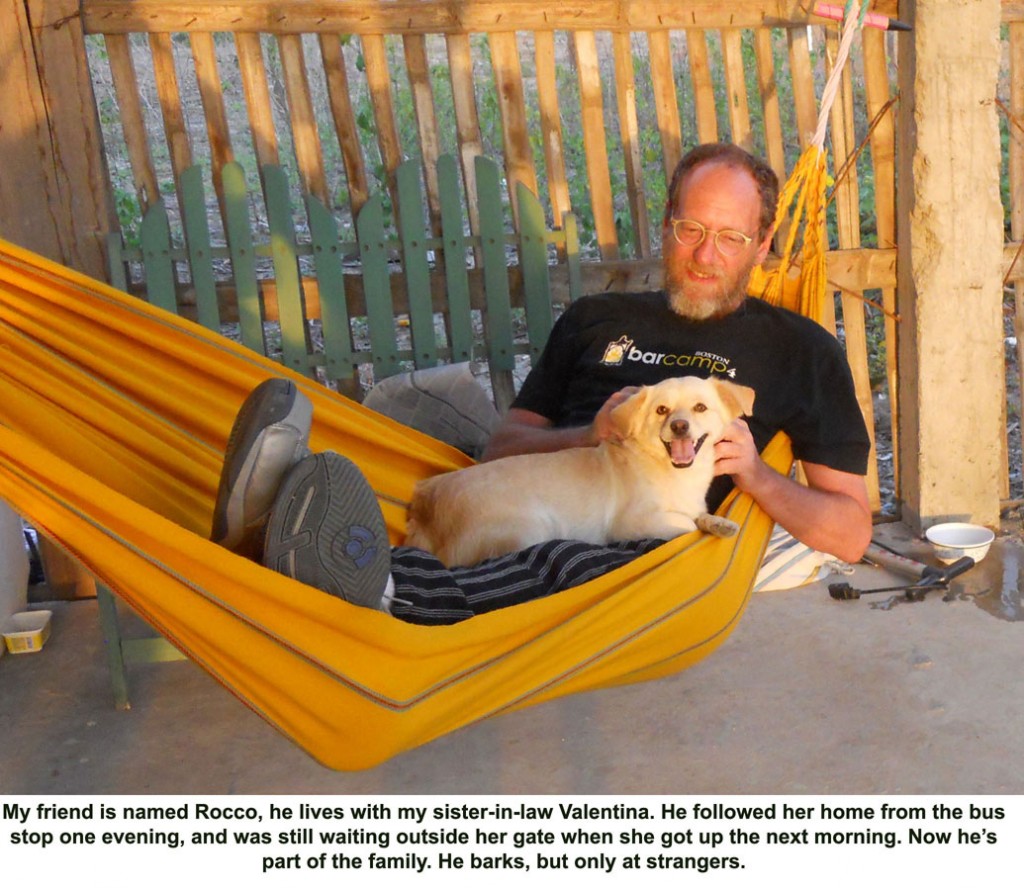
It is a magical moment in Manta these days; the city is poised for a major expansion. Every time I go to the supermarket, even when there are no cruise ships in town, there seem to be more white haired retirees in Bermuda shorts and grungy surfers in designer shades. The Canadian real estate company Remax has just started turning over the first houses in their 1200 lot development down the coast on a stretch of virgin beach. There is a zest in the air, the scent of fresh money and ambition, sure to lead to less than completely relaxing results. Our hope is that the size and varied economic backbone of the city and province will partially inure them to the crass commercialism that generally accompanies such robust growth.
But enough. Norma is calling me to make the toughest decision of the day – where to have lunch. Williams apparently has cheese noodle soup and chicken breast with lentils as the special (+ salad, flan and passion fruit juice for $3.50), and we haven’t been there for a while. More later
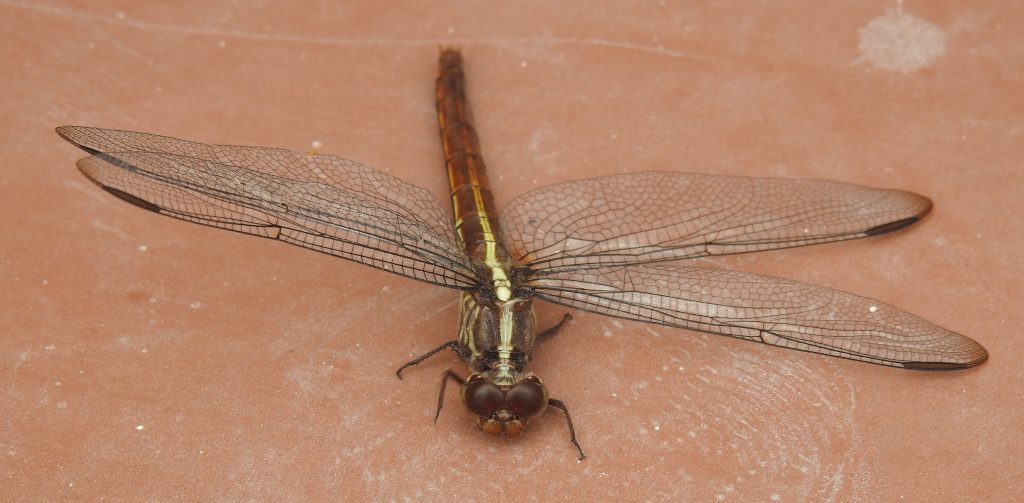 My long history with insects has mostly been one of unrequited love. They always seemed to want to crawl all over me, but the feeling was not mutual. My earliest memory of insects was playing placidly in our leafy suburban backyard and suddenly being engulfed in a globular swarm of gnats. I couldn’t have been more than four or five. I remember staring fasinated at a conglomeration of hundreds of tiny living beings acting in concert. I ad mired their ability to form a cloud and move it around, right up until they decided to move it around my curly-haired head. I opened my mouth to cry for Mommy and it was promptly invaded by six or seven of the suckers, and they didn’t taste good. So before I tell my tale of the tennis scorpion I wanted to make it clear that I am not 100% anti-insect. I have had many awesome interactions with beautiful ladybugs, butterflies, water-walkers and exquisite dragonflies like the one I shot (with a camera not an AK) in our rear patio.
My long history with insects has mostly been one of unrequited love. They always seemed to want to crawl all over me, but the feeling was not mutual. My earliest memory of insects was playing placidly in our leafy suburban backyard and suddenly being engulfed in a globular swarm of gnats. I couldn’t have been more than four or five. I remember staring fasinated at a conglomeration of hundreds of tiny living beings acting in concert. I ad mired their ability to form a cloud and move it around, right up until they decided to move it around my curly-haired head. I opened my mouth to cry for Mommy and it was promptly invaded by six or seven of the suckers, and they didn’t taste good. So before I tell my tale of the tennis scorpion I wanted to make it clear that I am not 100% anti-insect. I have had many awesome interactions with beautiful ladybugs, butterflies, water-walkers and exquisite dragonflies like the one I shot (with a camera not an AK) in our rear patio.


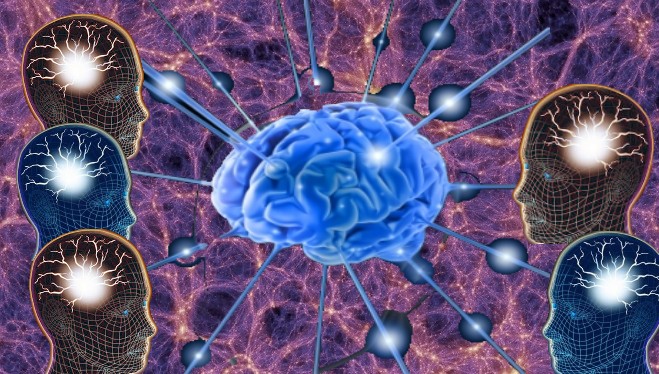
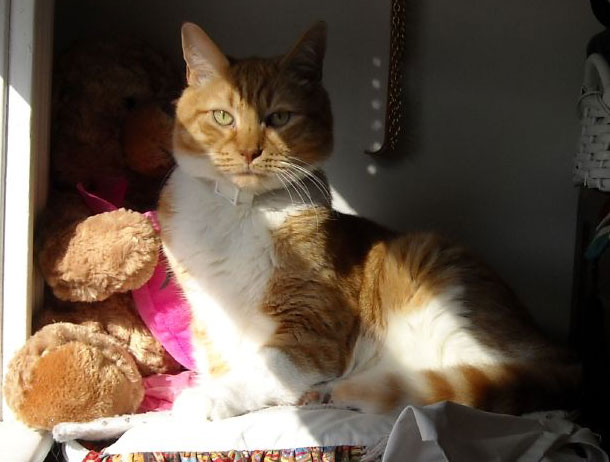
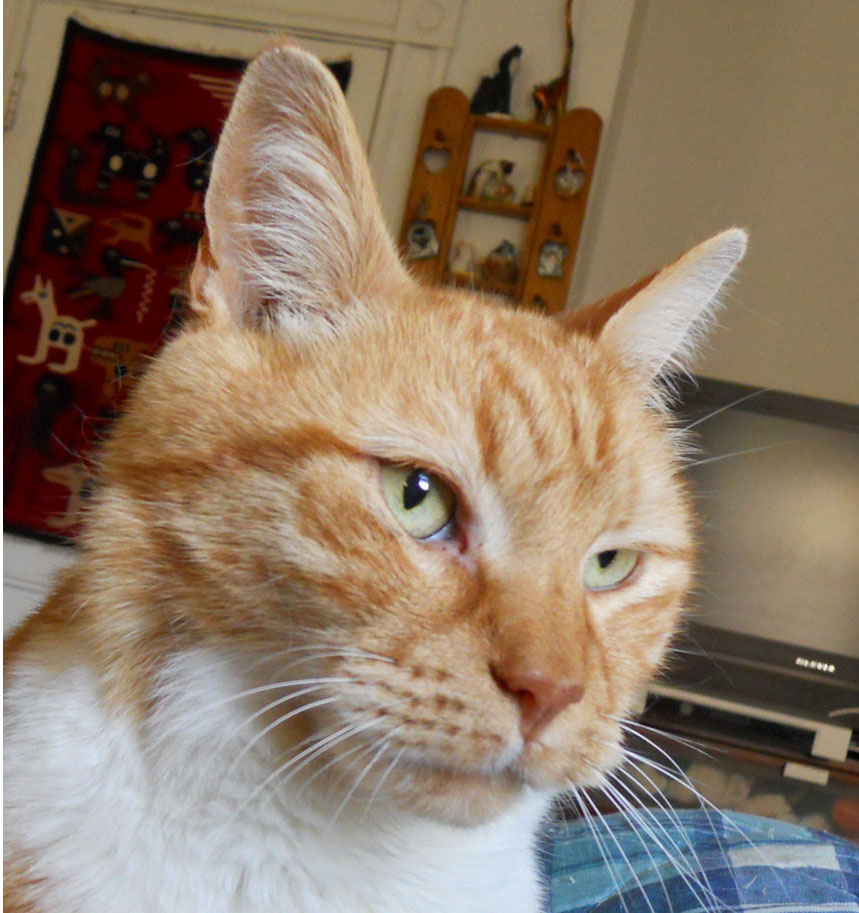 According to several of the world’s great religions, and backed by abundant empirical data, life as we know it consists largely of pain and suffering, salted with moments of enlightened inspiration and temporary alleviation of the burdens we all carry.
According to several of the world’s great religions, and backed by abundant empirical data, life as we know it consists largely of pain and suffering, salted with moments of enlightened inspiration and temporary alleviation of the burdens we all carry.

















